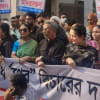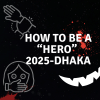Let women thrive both online and offline

The world celebrated this year's International Women's Day (IWD) with the theme "For ALL Women and Girls: Rights. Equality. Empowerment." While the global message envisions a future where women and girls lead as changemakers, our nation's reality remains far from this vision. The promise of equality is overshadowed by the harsh realities on the ground. Our governance and law-and-order systems are in a state of constant disruption, increasingly influenced by violent groups who see women as easy targets—both online and offline.
The recent spate of crimes against women has been more than troubling. Digital space has become a breeding ground for gendered violence which is not contained within the digital sphere. It is affecting women and adolescent girls in offline spaces. It seeps into their daily lives, affecting their psychological and physical well-being and resulting in paranoia, shame, isolation, and even death. Take the tragic example of a 17-year-old girl who died by suicide after her ex-husband circulated private photos of her online. When the images spread, she faced immense social pressure and shame, ultimately leading to her death.
Even accomplished and well-known women are not spared. National-level footballer Matsushima Sumaya received rape and death threats after speaking out against the team coach. Environment, Forest and Climate Change Adviser Syeda Rizwana Hasan and well-known actress Mehazabien Chowdhury were targeted with AI-generated images.
Similarly, a video was falsely linked to Nusrat Tabassum, a Dhaka University student and a central executive committee member of the Anti-Discrimination Student Movement. The daughter of Shafiqul Alam, chief adviser's press secretary, also became a victim of deepfake images.
Hate speech targeting women and marginalised communities in Bangladesh is now a pervasive issue. Social media spaces often serve as breeding grounds for misogynistic content. For instance, there are Facebook groups which actively spread misogynistic messages aimed at undermining feminist movements and silencing women's voices.
Women professionals also face relentless character assassinations. Many incidents illustrate how irresponsible reporting fuels misogyny and shifts focus away from professional allegations to personal slander, amplifying gender stereotypes.
Porimoni, a popular Bangladeshi actress, often faces online harassment rooted in deep-seated sexism. The abusive comments reflect a broader cultural problem where women in the public eye are judged harshly for their personal lives and professional choices. This pattern of online abuse highlights the widespread misogyny female public figures encounter, exposing the challenges they face in maintaining their presence and voice in a hostile digital environment.
Such behaviour underscores the urgent need for enhanced media literacy, accountability, and measures to curb online harassment, especially in Bangladesh's social media landscape.
Addressing this crisis requires immediate and comprehensive action. The government must enforce clear and robust regulations to combat cyber harassment and digital violence. Legal provisions should address online sexual exploitation, image-based abuse, and misinformation, ensuring swift judicial processes and strict penalties for offenders. Protecting victims must be a priority, with legal assistance, counselling, and financial support readily available.
Law enforcement agencies also need targeted training on digital rights, cybercrime, and gender sensitivity. Specialised cybercrime units focused on technology-facilitated gender-based violence (TFGBV) should be established to handle these cases with the urgency and expertise they require. Teachers should be trained to educate students about digital ethics and responsible online behaviour, equipping them to navigate the digital world safely and respectfully.
Moreover, fostering a culture of respect and empathy must begin in childhood. Schools should incorporate lessons on digital manners and ethics alongside traditional moral education. Children must learn that online behaviour carries real-world consequences and that respect for others extends beyond face-to-face interactions. Parents and educators should work together to instil values of kindness, accountability, and digital responsibility.
Addressing TFGBV is not just about protecting women—it's about upholding human rights and fostering just, inclusive societies. This fight aligns directly with Sustainable Development Goal 5 (Gender Equality) and SDG 16.10 (Ensuring public access to information and protecting fundamental freedoms). By creating safe digital spaces where women and marginalised communities can express themselves freely and participate fully in society, we move closer to a more equitable and peaceful world.
Let us remember that the journey towards equality requires collective effort. We must challenge patriarchal norms, demand responsible media practices, and push for stronger legal protections. Only then can we ensure a future where every woman and girl can thrive, both online and offline.
Promiti Prova Chowdhury is project manager at Voices for Interactive Choice and Empowerment. She can be reached at [email protected].
Views expressed in this article are the author's own.
Follow The Daily Star Opinion on Facebook for the latest opinions, commentaries and analyses by experts and professionals. To contribute your article or letter to The Daily Star Opinion, see our guidelines for submission.

 For all latest news, follow The Daily Star's Google News channel.
For all latest news, follow The Daily Star's Google News channel. 











Comments